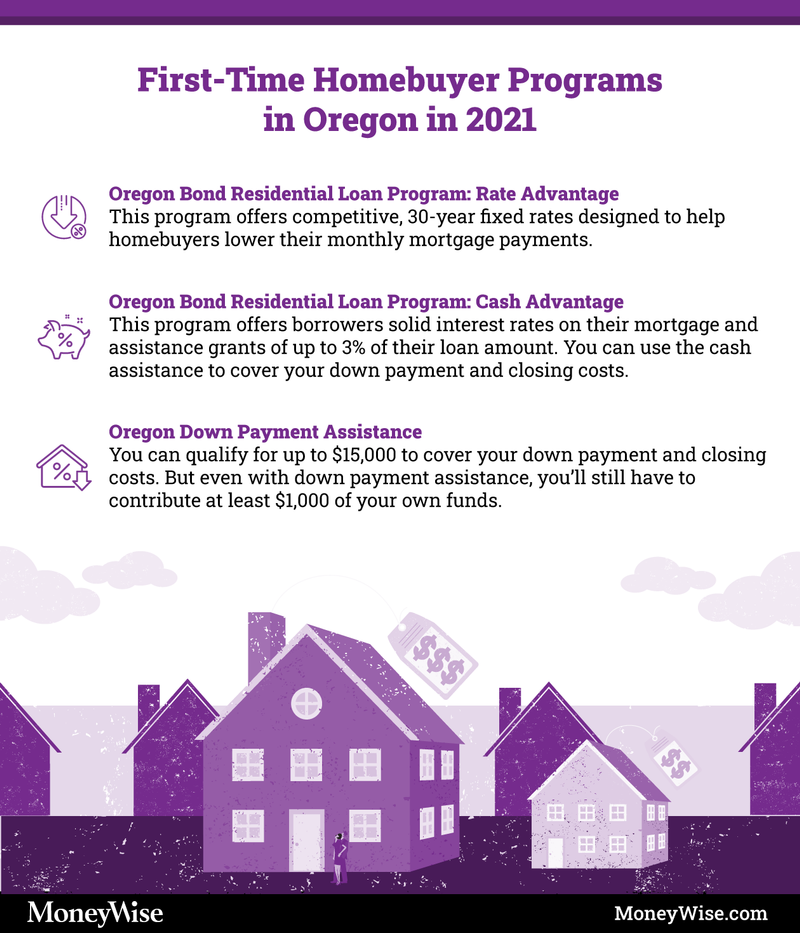First-time home buyer programs in Oregon
For first-time buyers, OHCS offers the Oregon Bond Residential Loan program. You get a choice between a lower interest rate or a grant you can use for your down payment and closing costs.
Working with one of OHCS’s participating mortgage lenders, qualified applicants can get the help they need to afford a quality home of their own.
Oregon Bond Residential Loan Program: Rate Advantage
The Rate Advantage stream offers competitive, 30-year fixed rates designed to help homebuyers lower their monthly mortgage payments.
The program is compatible with conventional, FHA, VA and USDA loans obtained through your participating lender.
Oregon Bond Residential Loan Program: Cash Advantage
This program offers borrowers solid interest rates on their mortgage, as well as assistance grants of up to 3% of their loan amount. You can use the cash assistance to cover your down payment and closing costs.
You can apply for this program with a conventional, FHA, VA or USDA loan. OHCS only stipulates that you can’t use the grant to cover the minimum investment required with an FHA loan.
Oregon Down Payment Assistance
OHCS also provides funding to a number of community organizations — like Habitat for Humanity or the African American Alliance for Homeownership — to support their own down payment assistance programs.
Each organization will have its own terms and conditions. In addition, you’ll have to complete a homebuyer education program and recommended coaching from the organization.
Through this method, you can qualify for up to $15,000 to cover your down payment and closing costs. But even with down payment assistance, you’ll still have to contribute at least $1,000 of your own funds.
More: Estimate house affordability with maximum mortgage calculator
The Best Lenders for a Mortgage
Click HereStop overpaying for home insurance
Home insurance is an essential expense – one that can often be pricey. You can lower your monthly recurring expenses by finding a more economical alternative for home insurance.
SmartFinancial can help you do just that. SmartFinancial’s online marketplace of vetted home insurance providers allows you to quickly shop around for rates from the country’s top insurance companies, and ensure you’re paying the lowest price possible for your home insurance.
Explore better ratesWho qualifies for OHCS and other down payment assistance programs in Oregon?
With below-market-rate financing and cash assistance through the Oregon Bond Residential Loan Program, OHCS makes it possible for more Oregonians to become homeowners.
To qualify, you’ll need to be a first-time homebuyer. Included in OHCS’s definition of first-time buyers are individuals who haven’t owned a home in the last three years.
Because these programs are designed to help low- to moderate-income households, you’ll have to fall within the purchase price limits and maximum household income limits set by OHCS.
You may have to contribute some of your own funds for your down payment. Depending on which loan program you use, the amount ranges from 0% to 3.5%.
More: Get a free credit score and credit monitoring from Credit Sesame.
Nationwide first-time homebuyer programs
To get a “conventional” loan — that is, one sourced directly through the private market — you’ll often need a credit score of at least 620 and a down payment of at least 5% of the purchase price.
More: Use these savings accounts to build up your down payment.
That’s tough enough for first-time buyers, but if your down payment falls under 20%, you’ll also have to pay for pricey mortgage insurance.
Many Americans entering the real estate market for the first time will find it easier to use one of these nonconventional mortgages offered by the federal government.
FHA loans
In 1934, following the Great Depression, the Federal Housing Administration created FHA loans to help more Americans become homeowners. At the time, the U.S. was a country of mostly renters.
Securing an FHA loan is less difficult than a conventional mortgage. Your credit score typically only has to be 580, and your down payment can be as low as 3.5% of the purchase price. But you may still be expected to pay additional fees for mortgage insurance depending on how much money you put down.
The FHA's Loan Requirements Explained.
A walkthrough of how to meet the FHA's requirements.
See GuideVA loans
Toward the end of the Second World War, Congress passed an act to increase benefits for its many veterans. That act made it possible for the U.S. Department of Veterans Affairs (VA) to guarantee or insure home, farm and business loans made to veterans by lending institutions.
These loans are available to active service members, veterans or surviving military spouses. VA loans don’t require down payments or mortgage insurance, though they do have a significant funding fee.
USDA loans
USDA loans are guaranteed by the United States Department of Agriculture to help lower-income rural and suburban Americans buy a home. Like VA loans, they also don’t require down payments or mortgage insurance.
When you take out one of these loans, you will face an upfront 1% guarantee fee and an annual 0.35% fee. However, these fees usually end up costing less in the long run than the mortgage insurance costs associated with other types of loans.
Sounds enticing, but remember that USDA loans are limited to lower-income Americans. The current income limits in most parts of the U.S. are $86,850 for one- to four-member households and $114,650 for five- to eight-member households, but the thresholds may be higher if you live in a county with a high cost of living. You can find your region’s limit on the USDA’s website.
Need cash? Tap into your home equity
As home prices have increased, the average homeowner is sitting on a record amount of home equity. Savvy homeowners are tapping into their equity to consolidate debt, pay for home improvements, or tackle unexpected expenses. Rocket Mortgage, the nation's largest mortgage lender, offers competitive rates and expert guidance.
Get StartedNext steps
Now you have all the information, but it might not be clear what you should do first.
Ideally, before you start the home loan process, you’ll have a good idea of how much you can afford and where your credit score stands.
Don’t know your score? You can get a free look through the site Credit Sesame. If you discover your credit’s not doing so well, you might want to use the services of a credit repair organisation like Self to bring your score up.
Once you’re in a better position, you’ll want to gather all of your critical documents so you can show you have some cash on hand and money flowing in.
Then you can finally get preapproved for a mortgage, check out some listings and start making your Oregon dreams come true.
| Arizona | |
| Arkansas | |
| California | |
| Colorado | |
| Connecticut | |
| Delaware | |
| Florida | |
| Georgia | |
| Hawaii | |
| Idaho | |
| Illinois | |
| Indiana | |
| Iowa | |
| Kansas | |
| Kentucky | |
| Louisiana | |
| Massachusetts | |
| Michigan | |
| Minnesota | |
| Missouri | |
| Montana | |
| Nebraska | |
| Nevada | |
| New Mexico | |
| New York | |
| North Carolina | |
| Ohio | |
| Oklahoma | |
| Oregon | |
| Pennsylvania | |
| South Dakota | |
| Tennessee | |
| Texas | |
| Utah | |
| Virginia | |
| Washington | |
| Wisconsin | |
| Wyoming |
Sponsored
Follow These Steps if you Want to Retire Early
Secure your financial future with a tailored plan to maximize investments, navigate taxes, and retire comfortably.
Zoe Financial is an online platform that can match you with a network of vetted fiduciary advisors who are evaluated based on their credentials, education, experience, and pricing. The best part? - there is no fee to find an advisor.









